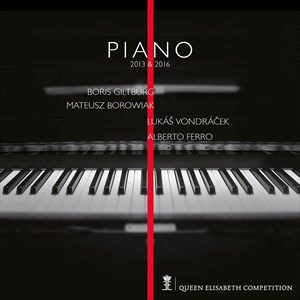Here are four discs respectively devoted to four pianists who made the final rounds in the 2013 and 2016 International Queen Elisabeth Competition, all in archival live performances. Disc 1 features 2013’s first place winner Boris Giltburg. Compared to the nobility, seriousness of purpose, and carefully integrated tempo relationships characterizing his 2013 studio recording of the Liszt Sonata, the presence of an audience and pressure of a jury elicits more spontaneous inflections within a surprisingly similar concept. By contrast, the fluid simplicity of his live Beethoven E major Sonata Op. 90 would give way to more self-aware inflections of phrase in his recent Naxos Beethoven cycle. The pianist’s Mozart B-flat Concerto K. 450 stands out for elegant wit and perky articulation in the Rondo finale.
However, I would have picked 2013’s third place winner Mateusz Morowiak for the top award. His Bach Partita No. 2 is a marvel of linear interplay between the hands and imaginative embellishments on repeats. His playful animation in the Mozart E-flat K. 271 concerto outer movements delights as much as his impeccably turned-out trills. His Ravel Gaspard de la nuit may not be the most sultry or demonic around, but it’s absolutely marvelous. You get a fleet and crystalline Ondine, a calmly sustained yet never dragging Le Gibet, plus a vividly poised and quicksilver Scarbo.
One immediately hears why Lukas Vondracek took 2016’s top prize. His Brahms Piano Sonata No. 3 abounds with ardency and sweep in the manner of Katchen and Rubinstein, even if the Andante and Intermezzo are not sufficiently inward. Classicism and control dominate his Rachmaninov Third Concerto, where he truly locks in ensemble-wise with Marin Alsop’s disciplined orchestral support, pulling back when first-desk soloists have the floor. He also doesn’t get bogged down by the alternate cadenza’s lumbering, elephantine piano writing; he actually makes it sound as transparent as the lighter cadenza favored by Horowitz, Argerich, Kocsis, and yours truly.
Because we’re spoiled for choice among world-class contenders from Gieseking to Gulda, and Schiff to Uchida in Mozart’s C major K. 467 concerto, it’s easy to undermine the 2016 sixth place winner Alberto Ferro’s excellent if less individual live performance. His individuality reveals itself more in a Liszt Hungarian Rhapsody No. 12 full of panache and sparkle, plus his volatile yet smartly unified Rachmaninov Corelli Variations.
Whatever appeal this release may have for piano mavens attuned to the competition scene, I know I’ll return to the Mateusz Morowiak selections and Lukas Vondracek’s Brahms more often than not.
































